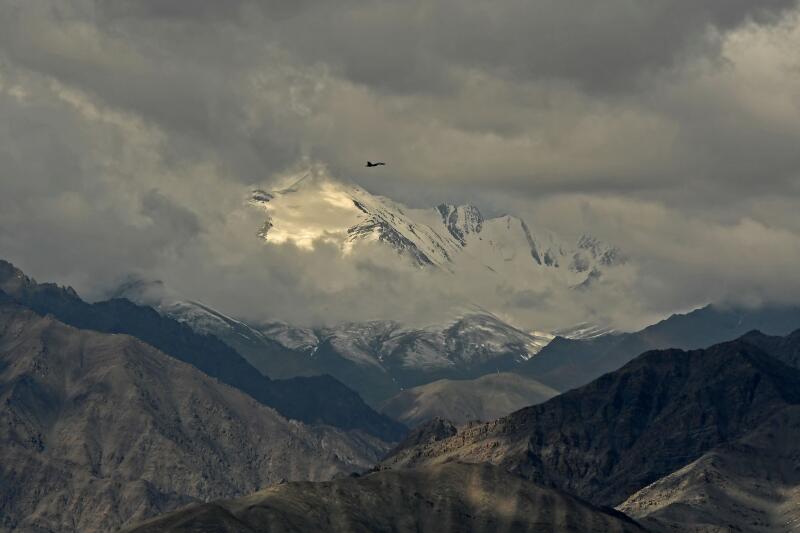Chinese troops seen withdrawing from flashpoint Himalayan valley: Indian army
Sign up now: Get insights on Asia's fast-moving developments

Twenty Indian soldiers were killed in brutal hand-to-hand fightingin the Galwan Valley in Ladakh, on June 15, 2020.
PHOTO: AFP
Follow topic:
NEW DELHI - China has reportedly pulled back troops from the Galwan Valley, site of a recent violent clash between Indian and Chinese soldiers, taking a first step back from a tense border stand off.
During a bloody face-off between the two sides on June 15, 20 Indian soldiers and an unknown number of Chinese soldiers were killed.
Indian Army sources said that the People's Liberation Army (PLA) were seen removing tents and structures in the Galwan Valley even as the two sides agreed to continue the disengagement process as they keep up talks at both military and diplomatic levels.
"Disengagement with PLA has started as per the agreed terms in the Corps Commander's meeting," a source told The Straits Times.
The two sides had agreed to pull back in the June 6 Corps Commander meeting, but the disengagement did not materialise following the violent clash just nine days later.
Rearward movement of PLA vehicles was also observed from Hot Springs and Gogra in the Ladakh region, sources said.
ANI news agency said the "extent of withdrawal is varied at different locations."
The Indian side did not say how far Indian troops had withdrawn.
Both countries had accused the other of initiating the violent clash.
The pullback also comes a day after National Security Advisor Ajit Doval and Minister of Foreign Affairs Wang Yi had a conversation over the phone regarding recent developments in the border areas.
The two men are their respective countries' Special Representatives, tasked with discussing border differences.
The Ministry of External Affairs press release said it was agreed during the call on Sunday that "it was necessary to ensure at the earliest complete disengagement of the troops along the LAC and de-escalation from India-China border areas for full restoration of peace and tranquility."
The two sides also agreed that the disengagement process should be done "expeditiously" while ensuring "a phased and stepwise de-escalation in the India-China border areas," and that military and diplomatic talks should continue.
A long standing border dispute between the two countries flares up violently on occasion, in spite of a thriving economic relationship that saw bilateral trade hitting US$92.68 billion in 2019.
Still, this two-month border standoff was the worst in decades, necessitating multiple rounds of military talks and diplomatic exchanges, even at foreign minister-level.
Chinese Foreign Ministry spokesman Zhao Lijian told reporters in Beijing that the two countries had made "positive progress...to disengage frontline troops and ease the border situation".
But Indian military and foreign policy analysts greeted reports of the pullback with caution.
"The matter is far from ended. The situation is still fluid since we don't have clarity about status quo ante (as specified by India). We have to wait and get details of the pull back," said Prof Alka Acharya, professor of Chinese and Southeast Asian Studies at Jawaharlal Nehru University.
"If pullback is merely disengagement in Galwan, does it give them (China) a toehold? It still leaves the question about our territory (being) in Chinese control, open ."
Journalist and former Indian Army officer Ajai Shukla tweeted: "Where have Indian troops pulled back to?"
This development comes as a new border row has surfaced between China and Bhutan, among India's closest neighbours.
China made a fresh claim over the Sakteng wildlife sanctuary in eastern Bhutan's Trashigang district during an online meeting of the Global Environment Facility, a US based body that provides financing for environmental projects.
The development is worrisome for India too, as the area is near the Indian state of Arunachal Pradesh, which China claims as its own.
Analysts said the border row had left India and China with a massive trust problem.
"As far as de-escalation is concerned, it remains to be seen how sincere they (Chinese) are. I don't think it will happen so quickly. We are still there for the long haul. But I would say it's a beginning to disengagement. They don't want to escalate it further," said Prof B.R. Deepak, professor at the Centre for Chinese and South East Asian Studies at Jawaharlal Nehru University.
"I think the damage is already done. The trust deficit is already there. Anti-China sentiments are rising high in this country. It's not going to be business as usual," he added.

